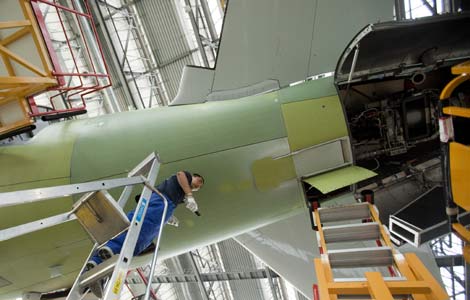Airbus SAS expects to win at least 100 orders for its A320 single-aisle airplanes from China this year despite an escalating trade spat between China and Europe over a carbon tax on airlines, a top company executive said.
"That is what we are talking with Chinese airlines (about) right now," said John Leahy, Airbus chief operating officer-customers, speaking on the sidelines of the company's annual Innovation Days technical briefing on Thursday at its headquarters.
|
 |
| An Airbus SAS employee works on an A320 aircraft at the company's assembly facility in Tianjin. AirAsia Bhd, the region's biggest budget carrier, will become the first foreign airline to receive an A320 assembled in Tianjin in December.?[Photo / Agencies] |
"These aircraft will only fly within China and they are coming off from the final assembly line in Tianjin. So they should not be part of the game. Everything is possible."
Gauged by catalogue prices, the deal will be worth at least $6.7 billion.
The Chinese government has suspended granting approvals to $12 billion worth of Airbus orders, the European aircraft manufacturer confirmed earlier. The suspended orders were for 35 A330 wide-body planes and 10 A380 superjumbo jets. Airbus said the suspension was a result of a dispute between China and Europe over the European Union's Emission Trading Scheme, or ETS, which will impose a carbon tax on airlines starting in 2013.
Airbus and eight other leading European airlines and aviation companies wrote a letter in March to European political leaders urging the EU to stop escalating the dispute. They said that countermeasures taken by countries opposed to the ETS have become "intolerable" to the European aviation industry.
In February, Chinese aviation authorities issued a notice forbidding all Chinese from paying the taxes imposed by the scheme.
"ETS has to be negotiated at a global level," said Fabrice Bregier, Airbus chief operating officer. "Europe has started discussions with China. We hope it will make faster progress."
Bregier said the ETS will not change Airbus' commitment to China nor its business strategies in the country, which is the largest market for commercial aircraft outside the United States.
Airbus' archrival, Boeing Co, is expected to receive about 200 orders from China for its B737 MAX this year, Jim Albaugh, CEO of Boeing Commercial Airplanes, was quoted as saying by Bloomberg in March.
The US plane maker received orders for 30 B777 wide-body jets - 20 from China Eastern Airlines and 10 from China Southern Airlines - earlier this year.
Meanwhile, Leahy said foreign airlines have shown interest in receiving A320s that were assembled in Tianjin, a northern port city in China.
AirAsia Bhd, the region's biggest budget carrier, will become the first foreign airline to receive an A320 assembled in Tianjin in December, AirAsia's CEO Tony Fernandes said on Thursday.
"We asked Airbus to deliver us an A320 in Tianjin. But at the moment, the line is filled by orders from Chinese airlines," said Fernandes. "We have flights to Tianjin. So it makes perfect sense to do so."
The Tianjin factory is Airbus' only final assembly line for aircraft outside Europe. The plant delivered its first A320 in June 2009, and has so far sent 86 aircraft to 10 Chinese airlines. It is now able to assemble three jets a month and is expected to increase that number to four a month by the end of the year.
The single-aisle A320 is Airbus' most popular model. By the end of April, Airbus had delivered 672 A320s to Chinese mainland carriers, accounting for 84 percent of the total fleet of Airbus planes that are operating on the mainland.
Although the Chinese government has lowered the country's 2012 target rate for GDP growth to 7.5 percent - the lowest in eight years - Airbus remains optimistic about its prospects in the Chinese market, Leahy said.
"Compared with the rest of the world, that is a total economic boom," Leahy said. "Until it (the growth rate) goes down to the level of the rest of the world, we are not concerned."
The number of passengers who traveled by air in China increased by 12.2 percent year-on-year last year. In the first quarter of this year, that growth rate has slowed to 10.2 percent, according to figures from the Civil Aviation Administration of China.
China can lay claim to the second-largest number of domestic air passenger traffic in the world, the seventh-largest number of international air passenger traffic and fourth-largest of international cargo traffic, according to the International Air Transport Association, which represents about 240 airlines that conduct about 84 percent of global air traffic.
"But this is only the beginning," Tony Tyler, director general and CEO of the association, said at a forum in Beijing on Wednesday.
"Of the 877 million additional global air travelers expected to fly in 2015 than in 2010, more than 212 million will be on journeys within or connected to China."
luhaoting@chinadaily.com.cn
